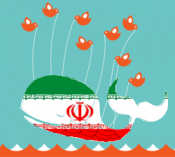 Last week several readers brought to my attention a Bloomberg story that announced in its headline “U.S. Wants Microsoft to End Message Ban in Iran, Cuba.” This created a bit of a hubbub at the world headquarters of Export Law Blog, since this blog has been advocating for some time that the information exception be read to cover instant messaging, twittering, and the like. Alas, as we learned at a tender age, you can’t believe everything you read in the newspapers. (You can, of course, believe everything you read in blogs.)
Last week several readers brought to my attention a Bloomberg story that announced in its headline “U.S. Wants Microsoft to End Message Ban in Iran, Cuba.” This created a bit of a hubbub at the world headquarters of Export Law Blog, since this blog has been advocating for some time that the information exception be read to cover instant messaging, twittering, and the like. Alas, as we learned at a tender age, you can’t believe everything you read in the newspapers. (You can, of course, believe everything you read in blogs.)
The Bloomberg story referenced a letter that OFAC sent last month to the Center for Democracy in the Americas, a group that, like Export Law Blog, has been a persistent critic of the Cuba sanctions. But when you read the letter, it’s quite clear that the letter doesn’t exactly say that the U.S. wants to end the application of sanctions to instant messaging services:
We assure you that the discontinuation of instant messaging services [by Microsoft to users in Cuba, Syria, Iran, Sudan and North Korea] was not directed by OFAC or, to our knowledge, any other Federal agency. Ensuring the flow and access to information available through the Internet and similar public sources is consistent with the policy interests of the United States Government.
OFAC is participating in an interagency effort to review any discontinuation of certain instant messaging services to sanctioned countries, with the goal of insuring that such services will be available to persons in sanctioned countries to the extent permitted by current U.S. law. [emphasis added]
The last clause is the catch here. OFAC has typically interpreted the information exception very narrowly, and there is no indication that OFAC has changed its view of what’s “permitted by current U.S. law.”
Instant messaging services require the download of software, and OFAC takes the position that software isn’t information covered by the information exception. Twitter creates a miniblog page with a unique URI for each user, which would, under OFAC’s narrow view of “information,” be considered provision of a service in violation of the sanctions regulations.
OFAC’s antiquated view of information, apparently formulated sometime between the invention of the printing press and Columbus’s discovery of the Americas, comprises only things written in ink on paper. Throw a few electrons into the mix and all bets are off.
So I wouldn’t take this OFAC letter to the bank if I were you. At least not yet.
 Permalink
Permalink
Copyright © 2009 Clif Burns. All Rights Reserved.
(No republication, syndication or use permitted without my consent.)

 Posted by
Posted by  Category:
Category: 

